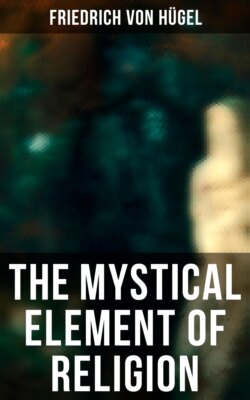Читать книгу The Mystical Element of Religion - Friedrich von Hügel - Страница 116
На сайте Литреса книга снята с продажи.
2. The Three Rules of Love. The Divine method of the soul’s purification.
ОглавлениеSome time during these new beginnings it must have been that “her Love once said within her mind: ‘Observe, little daughter, these three rules. Never say “I will,” or “I will not.” Never say “mine,” but ever say “our.” Never excuse thyself, but be ever ready to accuse thyself.’” And another time He said: “When thou sayest the ‘Our Father,’ take for thy foundation ‘Thy Will be done.’ In the Hail Mary, take ‘Jesus.’ In Holy Scripture take ‘Love,’ with which thou wilt ever go straightly, exactly, lightly, attentively, swiftly, enlightenedly, without error, without guide, and without the means of other creatures, since Love suffices unto itself to do all things without fear or weariness, so that martyrdom itself appears unto it a joy.”[107]
But this her love, just because it is so real and from God, appears indeed to fill her at any given moment, yet it grows and shows her, at each fresh stage, both its own incompleteness and her own imperfection, in her and its former stages. “At any one moment the love of that moment seemed to me to have attained to its greatest possible perfection. But then, in the course of time, my spiritual sight having become clearer, I saw that it had had many imperfections.” “Day by day I perceive that motes have been removed, which this Pure Love casts out and eliminates. This work is done by God, and man is not aware of it at the time, and cannot then see these imperfections; indeed God continuously allows man to see his (momentary) operation as though it were without imperfection, whilst all the time He, before Whom the heavens are not pure, is not ceasing from removing imperfections from his soul.”[108]
As ever throughout her life so now also, consolations are not the aim and end, but only the actual effects of her devotedness, and the ever fresh incentives to increased disinterestedness and self-surrender. And, with regard to these consolations, she again strove to escape all notice. “She would at times have her mind so full of divine love, as to be all but incapable of speaking; and would be in so great a transport of feeling as to be obliged to hide herself so as not to be seen. She would lose the use of her senses and remain like one dead; and, to escape the occurrence of such things, she would force herself to remain in company as much as possible. And she would say to her Lord: ‘I do not want that which proceedeth from Thee, but I want Thee alone, O tender Love.’ But just because her love was so sincere and she fled from consolations, her Lord gave her of them all the more.”[109]
